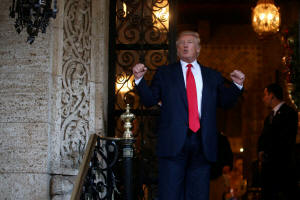Explainer-What charges might Trump face for removing White House
records?
 Send a link to a friend
Send a link to a friend
 [August 10, 2022]
By Luc Cohen [August 10, 2022]
By Luc Cohen
NEW YORK (Reuters) - Here is an outline of
the legal problems Donald Trump might face over his removal from the
White House of official presidential records that his son said had
prompted an FBI search on Monday of the former president's Mar-a-Lago,
Florida, estate.
WHAT DO WE KNOW ABOUT THE INVESTIGATION?
The National Archives notified Congress in February that it had
recovered 15 boxes of White House documents from Mar-a-Lago, some
containing classified materials. The Justice Department in April
launched an investigation into their removal.
Trump's son Eric told Fox News on Monday the FBI search was over
documents the National Archives had sought. Reuters was unable to learn
more details about the documents Eric Trump cited.
Donald Trump said on Monday the "raid" was "not necessary or
appropriate." He said he was cooperating with the relevant government
agencies. A Trump spokeswoman did not respond to a request for comment.
HOW SHOULD PRESIDENTS HANDLE THEIR RECORDS?
Several federal laws restrict what former presidents can do with
documents from their time in office; many carry felony penalties.

The Presidential Records Act provides that official documents - ranging
from briefing materials and meeting minutes to emails, texts and
handwritten notes - created or received by presidents or their top aides
are U.S. property, rather than the personal property of the president.
The law put the National Archives in charge of handling presidential
records.
WHAT IS TRUMP'S DEFENSE IF CHARGED?
The Presidential Records Act excludes documents "of a purely private or
nonpublic character" - including materials related to the president's
own election campaign - from its preservation requirements. Trump could
argue the documents he took were exempt.
Lara Trump, his daughter-in-law, said on Monday he had removed mementos
he was legally authorized to take.
But the law lays out a process for how presidents should go about
seeking exemptions for certain types of records from the National
Archives, said Jennifer Beidel, a former federal prosecutor and partner
at law firm Saul Ewing.
"If there's some question or concern, he's still supposed to follow the
procedure," Beidel said.
WHAT CHARGES COULD TRUMP FACE?
While the Presidential Records Act does not specify an enforcement
mechanism, taking presidential records from the White House could open
Trump up to charges of conspiring to impede the proper functioning of
the National Archives, said Jeffrey Cohen, an associate professor at
Boston College Law School and former federal prosecutor.
He could also be charged under a law, known by its code number 2071,
making it a crime to conceal or destroy U.S. public documents, or laws
making it illegal to steal or damage government property.
[to top of second column]
|

U.S. President-elect Donald Trump reacts at the entry way of Mar-a-Lago
estate after a meeting with Pentagon officials in Palm Beach,
Florida, U.S., December 21, 2016. REUTERS/Carlos Barria/File Photo

Even if the search warrant pertains to Trump's handling of official
documents, he could end up facing charges for different crimes, said
Mitchell Epner, a former federal prosecutor. Trump faces other
possible legal entanglements, including a probe into his supporters'
Jan. 6, 2021, attack on the U.S. Capitol.
"Once the government starts looking at documents that are seized,
they do not need to shut their eyes to evidence of other crimes that
they come across," Epner said.
WHAT IF THE DOCUMENTS WERE CLASSIFIED?
Federal law makes it illegal to intentionally take classified
documents to an unauthorized location. A source familiar with the
matter confirmed to Reuters the FBI's search appeared to be tied to
Trump's removal of classified records from the White House.
The president has broad powers to declassify documents, raising the
possibility Trump could have done so before taking the records to
Mar-a-Lago.
But he could be held culpable under a law preventing unauthorized
possession of national defense information, regardless of whether it
is classified, said David Aaron of law firm Perkins Coie, a former
federal prosecutor.
WHAT PRECEDENTS ARE THERE?
No former president has been criminally charged with mishandling
records. High-profile officials who have faced similar charges
include former CIA Director David Petraeus, who in 2015 pleaded
guilty to giving classified information to a mistress who was
writing his biography. He was sentenced to two years of probation
and ordered to pay a $100,000 fine.
Samuel Berger, a U.S. national security adviser to former President
Bill Clinton, pleaded guilty in 2005 to unauthorized removal and
retention of classified material. He was fined more than $50,000 and
given a sentence of 100 hours community service and two years'
probation.
COULD TRUMP BE BARRED FROM FUTURE OFFICE?
A provision of 2071 states that anyone convicted will be barred from
holding federal office and face a prison term of up to three years.

But experts said that provision may not be constitutional. The U.S.
Constitution sets forth the qualifications for holding federal
elected office, and previous Supreme Court rulings have held that
Congress cannot limit who can run for the presidency, the Senate or
the House.
If convicted and disqualified from office, Trump would likely
challenge it in court, where the outcome would be far from certain.
(Reporting by Luc Cohen in New York; Additional reporting by Steve
Holland in Washington and Daniel Fastenberg; Editing by Howard
Goller)
[© 2022 Thomson Reuters. All rights
reserved.]
This material may not be published,
broadcast, rewritten or redistributed.
Thompson Reuters is solely responsible for this content. |